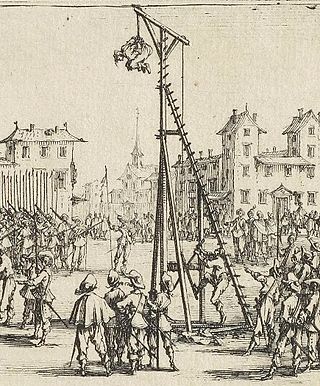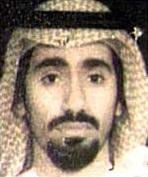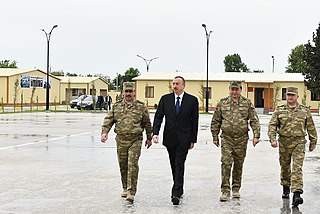
The European Convention on Human Rights is an international convention to protect human rights and political freedoms in Europe. Drafted in 1950 by the then newly formed Council of Europe, the convention entered into force on 3 September 1953. All Council of Europe member states are party to the convention and new members are expected to ratify the convention at the earliest opportunity.

In an extradition, one jurisdiction delivers a person accused or convicted of committing a crime in another jurisdiction, over to the other's law enforcement. It is a cooperative law enforcement procedure between the two jurisdictions and depends on the arrangements made between them. In addition to legal aspects of the process, extradition also involves the physical transfer of custody of the person being extradited to the legal authority of the requesting jurisdiction.

The strappado, also known as corda, is a form of torture in which the victim's hands are tied behind his back and the victim is suspended by a rope attached to the wrists, typically resulting in dislocated shoulders. Weights may be added to the body to intensify the effect and increase the pain. This kind of torture would generally not last more than an hour without rest, as it would likely result in death.

Abd al-Rahim Hussein Muhammed Abdu al-Nashiri is a Saudi Arabian citizen alleged to be the mastermind of the bombing of USS Cole and other maritime attacks. He is alleged to have headed al-Qaeda operations in the Persian Gulf and the Gulf states prior to his capture in November 2002 by the CIA's Special Activities Division.

International organizations have frequently alleged that Azerbaijan has violated human rights standards established in international law.

Human rights in Armenia tend to be better than those in most former Soviet republics and have drawn closer to acceptable standards, especially economically. Still, there are several considerable problems.
Russia incurred much international criticism for its conduct during the Second Chechen War, which started in 1999. The governments of the United States and other countries condemned deaths and expulsions among civilians. The United Nations Commission on Human Rights (UNHCR) passed two resolutions in 2000 and 2001 condemning human rights violations in Chechnya and requiring Russia to set up an independent national commission of inquiry to investigate the matter. However, a third resolution on these lines failed in 2004. The Council of Europe in multiple resolutions and statements between 2003 and 2007 called on Russia to cease human rights violations. The European Court of Human Rights (ECHR) between 2005 and 2007 conducted legal cases brought by Chechens against the Russian government, and in many of these cases held Russia responsible for deaths, disappearances and torture.
Article 8 of the European Convention on Human Rights provides a right to respect for one's "private and family life, his home and his correspondence", subject to certain restrictions that are "in accordance with law" and "necessary in a democratic society". The European Convention on Human Rights (ECHR) is an international treaty to protect human rights and fundamental freedoms in Europe.
Article 3 of the European Convention on Human Rights prohibits torture, and "inhuman or degrading treatment or punishment".
Article 3 – Prohibition of torture
No one shall be subjected to torture or to inhuman or degrading treatment or punishment.

Bakhtiyar Ilyas oglu Hajiyev is an Azerbaijani activist and blogger who served a prison sentence from 2011 to 2012 on charges of evading military service. His imprisonment was protested by numerous human rights organizations.

Chiragov v. Armenia was an international human rights case regarding the rights to property of Azeri nationals in the Nagorno-Karabakh region of former Soviet Azerbaijan. The judgment of the Grand Chamber of the European Court of Human Rights on the case originated in an application against the Republic of Armenia lodged with the Court under Article 34 of the Convention for the Protection of Human Rights and Fundamental Freedoms by six Azerbaijani nationals on 6 April 2005. The applicants alleged, in particular, that they were prevented from returning to the district of Lachin in territory occupied by the respondent Government, that they were thus unable to enjoy their property and homes located there, and that they had not received any compensation for their losses.

Zarema Gaisanova — is a human rights activist, a native Chechen. On October 31, 2009, Zarema Gaisanova was kidnapped in Chechen Capital of Grozny by group of armed men during a special operation headed by president of Chechen Republic, Ramzan Kadyrov. Zarema Gaisanova was a worker for Danish Refugee Council in Chechen Republic, and, according to Zarema Gaisanova's colleagues, she was abducted and probably murdered.

Alexander Valerievich Lapshin is a Soviet-born travel blogger and journalist. Lapshin holds Russian, Israeli, and Ukrainian citizenship. In 2016 Lapshin was arrested in Minsk at the request of the Azerbaijani authorities and extradited to Baku due to a visit to Nagorno-Karabakh. On May 20, 2021, the European Court of Human Rights in Strasbourg ruled on the blogger's complaint against the Republic of Azerbaijan, finding the country's authorities responsible for the illegal arrest, torture and attempted murder against Lapshin.
In September 1967, Denmark, Norway, Sweden and the Netherlands brought the Greek case to the European Commission of Human Rights, alleging violations of the European Convention of Human Rights (ECHR) by the Greek junta, which had taken power earlier that year. In 1969, the Commission found serious violations, including torture; the junta reacted by withdrawing from the Council of Europe. The case received significant press coverage and was "one of the most famous cases in the Convention's history", according to legal scholar Ed Bates.
In the case of Hirsi Jamaa and Others v. Italy, before the European Court of Human Rights, the Grand Chamber of the Court found in February 2012 that by returning migrants to Libya, without examining their case, the state of Italy exposed the migrants to the risk of ill-treatment and amounted to a collective expulsion. The case concerned 24 migrants from Somalia end Eritrea that were travelling from Libya to Italy that were intercepted at sea by Italian authorities who sent them back to Libya.
Azerbaijan has been a member of the Council of Europe, an international organization that focuses on strengthening democracy and human rights, since 2001. As a member, it has attracted attention for holding political prisoners, low implementation of verdicts of the European Court of Human Rights (ECtHR), and bribing Council of Europe parliamentarians to suppress negative information about its human rights record. In 2017, the Committee of Ministers launched the first ever infringement proceeding against Azerbaijan after it refused to release opposition politician Ilgar Mammadov after a 2014 ECtHR verdict that his imprisonment was unlawful. There has also been criticism of Azerbaijan's continued membership by those who believe its lack of human rights protection undermines the credibility of the Council of Europe.

Karen Petrosyan v. Azerbaijan was an international human rights case regarding the rights of Artush Petrosyan and his son Karen Petrosyan – an Armenian national from Chinari village, Tavush province of Armenia, who died while in captivity in Azerbaijan in 2014. The judgment of the European Court of Human Rights on the case originated in an application against the Republic of Azerbaijan lodged with the Court under the Convention for the Protection of Human Rights and Fundamental Freedoms by the applicant, Artush Petrosyan, on 25 April 2016. He Submitted that his son had been publicly humiliated, tortured and killed by decapitation by Azerbaijani State agents and that "his son’s body had not been repatriated in a timely manner, that there had been no effective investigation on and that the alleged violations had occurred as a result of discrimination based on ethnic origin".
Armenian prisoners of the Second Nagorno-Karabakh War are servicemen of the Defense Army of the Republic of Artsakh and the Armed Forces of the Republic of Armenia, as well as civilians and other detainees, who surrendered or were forcibly captured by the Azerbaijani Armed Forces during and after the conflict in 2020 between Azerbaijan and the self-proclaimed Republic of Artsakh together with Armenia in the disputed region of Nagorno-Karabakh and surrounding areas.

Sargsyan v. Azerbaijan was an international human rights case regarding the rights of Armenian refugees displaced from former Soviet Azerbaijan because of the conflict in Nagorno-Karabakh. The judgment of the Grand Chamber of the European Court of Human Rights on the case originated in an application against the Republic of Azerbaijan lodged with the Court under Article 34 of the Convention for the Protection of Human Rights and Fundamental Freedoms by Minas Sargsyan on 11 August 2006. He was forced to flee his home in the village of Gulistan in Shahumyan region of former Soviet Azerbaijan, together with his family, because of the Azerbaijani bombardments of the village and was not allowed to return and unable to get any compensation from the Azerbaijani authorities. Even though the applicant died in 2009, as did his widow, Lena Sargsyan, in 2014, his children, Vladimir and Tsovinar Sargsyan, represented him in court to continue the proceedings.

The Tartar Case is a case of large scale torture that took place in Azerbaijan, dealing with Azerbaijani military personnel accused of treason in 2017 in the aftermath of the Nagorno-Karabakh war in April 2016. According to the authorities and human rights defenders, more than 400 people were subjected to torture in the course of the case. The Azerbaijani authorities claim one person was killed as a result, while human rights defenders say the number is about 13, and many were wrongfully convicted and given hefty prison sentences.












